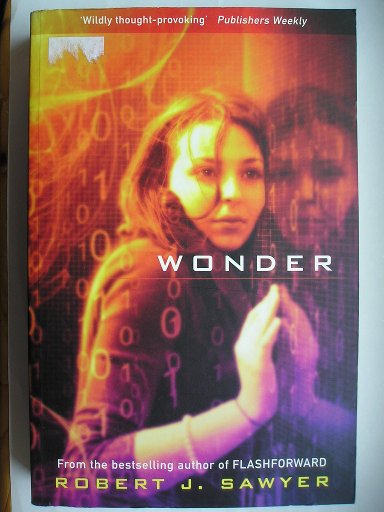
The novel “WWW: Wonder” was published for the first time in 2011. It’s the third volume of the WWW trilogy and is the sequel to “WWW: Watch“.
Webmind survived the American attack but is still in danger. This intelligence emerged from the Internet infrastructure has decided to be friendly towards humans. With its processing capacity it analyzed a series of medical articles to put together the idea for a possible treatment of various forms of cancer it has made publicly available. This, however, isn’t enough to convince all of its good will.
While Caitlin Decter, the girl born blind who had the first contact with Webmind tries to protect it, the American government decides for a new type of attack to destroy it. The Chinese instead react to its discovery trying to isolate their Internet infrastructure from the rest of the world.
In “WWW: Wonder” Robert J. Sawyer further develops the themes of the two previous novels to reach the conclusion of the trilogy. The previous novel “WWW: Watch” ended with a series of choices made by various characters, in this third novel those choices lead to different consequences.
Webmind chose to reveal its existence to human beings and to help them. To prove its good it offers them an idea for a possible cure of various forms of cancer. It achieves that using the web for its original purpose, to facilitate the exchange of information among researchers. Webmind reads all the documents on the subject existing on the web and thanks to its huge processing capacity is able to find correlations and connections that lead to the final result.
The choices of some governments are negative. The U.S. government continues to be extremely suspicious of Webmind and Colonel Peyton Hume tries a new approach for another attempt to destroy it. The Chinese government decided instead to isolate its infrastructure of the Internet and this causes an unexpected type of effects on Webmind.
In China the subplot about Wong Wai-Jeng is resumed. This dissident blogger is forced to work for his government after he got caught. His story is linked to that of Webmind in various ways.
Meanwhile, Caitlin Decter’s life continues between her attempts to live like a normal girl and her privileged relationship with Webmind, which forces her to be a public figure. The development of her character but also of other significant characters of the trilogy happened especially in the earlier novels, again “WWW: Wonder” shows mostly the consequences of their previous actions.
The previous novels were very idea-driven, in “WWW: Wonder” there’s more action although it’s often in a sense virtual since it happens via computer. This is inevitable given that Webmind is at the center of the events in the novel but there’s also physical action.
For example, the story of Hobo, the chimpanzee/bonobo hybrid, which in many ways is developed in parallel with that of Webmind in the course of the trilogy, in this last novel is more closely and directly connected to that of the intelligence emerged in the infrastructure of the Internet.
The communication between various species, considering Webmind as a species on its own, was one of the underlying themes of the WWW trilogy. In “WWW: Wonder” its development leads mainly to the theme of peace. Robert J. Sawyer also mentions real people who in the past have received the Nobel Peace Prize such as Andrei Sakharov and Liu Xiaobo.
In the previous novel, Robert J. Sawyer had already expressed some optimism about the future and in this conclusion of the WWW trilogy this element is even more pronounced. Today’s world situation and the massive amount of information being spread about today’s tragic events and dangers have their effects on fiction too. In the field of science fiction there’s alto a trend towards dramatic stories, often seti in a future negative if not dystopian, the opposite of the one depicted by Sawyer.
There are excellent science fiction stories in which the future is born in pain but it seems unfair to stigmatize the WWW trilogy as naive simply because Webmind doesn’t want to eliminate humans and the story shows a better future born without a bloodshed.
It’s the problem of self-fulfilling prophecy: if people think that things will get worse that’s almost bound to happen. In “WWW: Wonder” Webmind is a catalyst for positive change in the attitude of many people and this ends up helping to improve their situation. Obviously, Webmind’s direct intervention is crucial about that but in many cases that’s possible also thanks to people who act because they’re convinced that things can improve.
Due to its characteristics, “WWW: Wonder” is more interesting for its social and political contents than its purely scientific ones. In my opinion, it’s a fitting conclusion to a excellent thought-provoking trilogy and I highly recommend reading it all.

